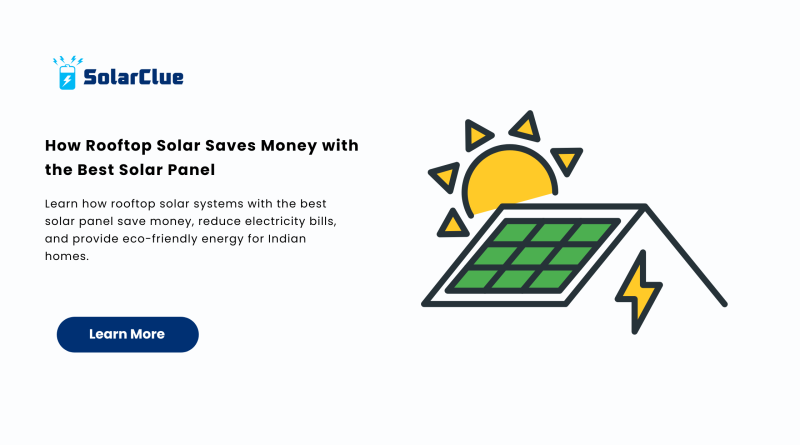How Rooftop Solar Saves Money with the Best Solar Panel
For decades, electricity bills have been a constant burden for households. Rising tariffs, unpredictable fuel costs, and growing energy demands have made it harder for families to manage monthly budgets. But what if there was a long-term solution that could reduce your bills significantly while helping the environment? That’s exactly what rooftop solar systems with the best solar panel deliver.
Across India, thousands of households and businesses are switching to solar panels to save money and achieve energy independence. In this detailed guide, we’ll explore how rooftop solar systems work, the financial benefits they bring, the role of government subsidies, and why choosing the best solar panel is key to maximizing savings.
Table of Contents
- 1 Understanding Rooftop Solar Systems
- 2 How Rooftop Solar Saves Money
- 3 Why Choosing the Best Solar Panel Matters
- 4 Case Study: Family Savings with Rooftop Solar
- 5 Government Subsidies and Support
- 6
- 7 Environmental Benefits Alongside Financial Savings
- 8 Rooftop Solar vs Conventional Energy
- 9 Maintenance of Rooftop Solar Panels
- 10 Challenges and How to Overcome Them
- 11 Future of Rooftop Solar in India
- 12 FAQs
- 13 Conclusion
Understanding Rooftop Solar Systems
A rooftop solar system is an installation of solar panels on the roof of your home, which captures sunlight and converts it into electricity. The generated electricity can be used instantly, stored in batteries, or exported to the grid via net metering.
There are three main types:
-
Grid-Tied Systems: Connected to the local DISCOM; extra power is exported, and you earn credits.
-
Off-Grid Systems: Independent from the grid, with battery backup.
-
Hybrid Systems: Combination of both, offering reliability and flexibility.
Each setup has its pros and cons, but all help reduce electricity costs.
How Rooftop Solar Saves Money
1. Cutting Monthly Electricity Bills
The biggest advantage of rooftop solar is a sharp drop in electricity bills. By generating your own power, you rely less on the grid. For example, a 5 kW system can save up to ₹7,000–₹10,000 per month depending on usage.
2. Earning Through Net Metering
If your system generates more electricity than you consume, the extra power is fed back into the grid. This earns you credits that further reduce your bill.
3. Protection Against Tariff Hikes
Electricity prices rise almost every year. But once you install solar, your cost of energy is fixed for 25+ years.
4. High ROI (Return on Investment)
The initial investment may seem high, but most systems pay for themselves within 3–5 years. After that, you enjoy nearly free electricity.
Why Choosing the Best Solar Panel Matters
Not all solar panels are equal. The best solar panel ensures:
-
Higher Efficiency: More power generated per square foot.
-
Better Durability: Long lifespan of 25–30 years.
-
Reliable Warranty: Peace of mind with 25-year performance guarantees.
-
Low Maintenance: Less frequent cleaning and servicing.
Popular options include monocrystalline solar panels (high efficiency, space-saving) and polycrystalline solar panels (cost-effective for larger rooftops).
Case Study: Family Savings with Rooftop Solar
Consider a family in Pune with an average monthly bill of ₹8,000. They installed a 5 kW rooftop solar system with high-efficiency panels for ₹3 lakh.
-
Monthly savings: ₹7,500
-
Annual savings: ₹90,000
-
Payback period: 3.3 years
-
Total savings over 25 years: ₹20–25 lakh
This demonstrates how the best solar panel installation is not an expense but an investment.
Government Subsidies and Support
To make adoption easier, the Indian government offers subsidies through schemes like PM Surya Ghar Muft Bijli Yojana.
-
Up to 40% subsidy for residential rooftop solar systems up to 3 kW.
-
Additional incentives for larger systems.
-
Easy loans from banks to cover upfront costs.
By combining subsidies with savings, homeowners can reduce payback time significantly.
Environmental Benefits Alongside Financial Savings
Beyond money, rooftop solar systems bring immense environmental advantages:
-
Each 1 kW of solar saves around 1.5 tons of CO₂ annually.
-
Reduced reliance on fossil fuels like coal.
-
Contribution to India’s renewable energy goals (target of 500 GW by 2030).
By installing the best solar panel, you not only save on bills but also make your home eco-friendly.
Rooftop Solar vs Conventional Energy
| Factor | Rooftop Solar | Grid Electricity |
|---|---|---|
| Cost | One-time investment, minimal ongoing cost | Monthly bills increase over time |
| Lifespan | 25–30 years | Depends on grid reliability |
| Control | Energy independence | Dependent on DISCOM |
| Environment | Clean, renewable | Polluting (coal, gas) |
Clearly, solar wins in long-term financial and environmental benefits.
Maintenance of Rooftop Solar Panels
Contrary to popular belief, solar panels require very little maintenance:
-
Cleaning: Wipe off dust and dirt every 15–20 days.
-
Check Wiring: Inspect connections once a year.
-
Monitor Performance: Use apps or inverter data to track output.
-
Professional Service: Annual inspection is recommended.
Challenges and How to Overcome Them
-
Initial Cost: Overcome with subsidies and EMI financing.
-
Space Requirement: Choose monocrystalline panels if roof space is limited.
-
Shade Issues: Install optimizers or micro-inverters.
Future of Rooftop Solar in India
The future is bright. With manufacturing expansion under the ALMM (Approved List of Models & Manufacturers) and government targets, costs will drop further. Innovations like bifacial panels, solar tiles, and AI-powered monitoring will make systems even more efficient.
FAQs
Q1. How much can I save with rooftop solar?
Savings vary but typically range between 70–90% of your monthly electricity bill.
Q2. Are rooftop solar panels reliable during power cuts?
Yes, if paired with a hybrid inverter and battery backup.
Q3. Which is the best solar panel for Indian homes?
Monocrystalline panels are preferred due to higher efficiency.
Q4. How long will it take to recover my investment?
Most homeowners recover costs in 3–5 years.
Q5. Can I expand my rooftop solar system later?
Yes, systems are modular and can be scaled up based on needs.
Conclusion
Switching to rooftop solar with the best solar panel is one of the smartest financial and environmental decisions you can make. From reducing monthly bills to ensuring energy independence, the benefits are undeniable. With government support and modern technology, there’s no reason to delay adopting solar energy.
If you’re ready to unlock long-term savings and a sustainable future, explore expert insights at solarclue.com and blog.solarclue.com




